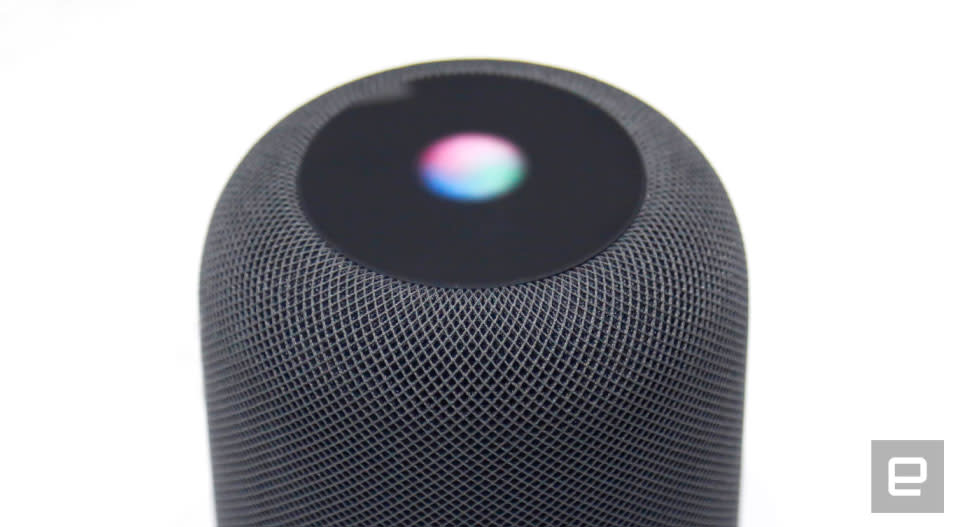Don't compare Apple's HomePod to Amazon's Echo
Apple is consciously avoiding direct competition with its obvious rivals.
When Apple unveiled the HomePod at WWDC, it was tempting to draw immediate comparisons to the Amazon Echo and Google Home. And I wouldn't blame you if you did. They're all smart speakers, of course, and there's a good chance that you might cross-shop them in the right circumstances. However, it's increasingly clear that a one-for-one comparison doesn't hold up. If anything, Apple is consciously avoiding direct competition with Echo-like speakers -- it's playing up its strong point, audio quality, while downplaying the importance of its AI assistant. This strategy certainly has its risks, but it may also help the HomePod stand out where it would otherwise drown in a sea of rivals.
Most smart speakers you see today are really AI helpers first and foremost. They're there to tell you about the weather, turn on the lights and guide you through recipes. And they can be extremely useful in that light -- you can check the news while your hands are covered in flour. However, music playback is... well, not an afterthought, but definitely lower on the ladder. While you can obviously play tunes on an Echo or Home, you aren't going to buy one expecting more than passable sound quality.
The HomePod is the flip side of that coin. Apple spent most of its introduction time emphasizing the HomePod's audio prowess, treating Siri's help as almost secondary. In fact, it first pitched Siri as a "musicologist" that helps you discover new artists. Smart home control? The weather? They're available, but you're not buying a HomePod primarily with those in mind. Apple didn't even hint at support for third-party skills, so you shouldn't expect it to handle more than a limited range of tasks.

As a result, this isn't so much an Echo-alike as it is a Sonos speaker on steroids. And the price reflects that -- the $349 price makes it roughly twice as expensive as the $180 Echo, and nearly three times as costly as the $120 Home. That will rule it out if you're just looking for a low-cost voice assistant, but it looks much more favorable if you're pitting it against wireless speakers like the Play:3. You're getting a high-quality speaker (based on our initial listen, at least) that, for a little more cash, offers some proper smarts. Why would you even look at a standard Echo if you're shopping in this price range and care about audio fidelity?
To be clear, this isn't Apple's surefire ticket to success. There's a real possibility that voice assistants become mainstays in the living room, and that the HomePod's combination of a music-first focus and a high price will make it an outlier in the long run. Amazon's Alexa and Google Assistant are both decidedly more flexible than Siri (we certainly wouldn't count on Apple offering Spotify support soon, if at all), and it remains to be seen how many people really want to pay $349 to get a smart speaker with above-average sound. The more affordable Echo might be fine for many people so long as the audio quality isn't atrocious.
This isn't even considering Amazon's ace in the hole, the $50 Echo Dot. If you aren't concerned about having an all-in-one device, why not get the speakers of your choice and slap a Dot on top? Add-ons aren't Apple's style, but it may lose customers who don't insist on an elegant solution.
Still, the HomePod may represent Apple's wisest course of action in the short term. If it had attacked Amazon and Google head-on, it would have endured some less-than-flattering comparisons. It doesn't completely escape those side-by-side examinations even now, but it's much easier to see the HomePod as distinct. Also, it's important to stress that you're looking at a first-generation product. It's possible that Apple will find more ways to separate its speaker from the crowd, or at least to address its weaknesses compared to lower-cost alternatives.
The big danger is simply that opponents aren't staying still. If Amazon or Google gets serious about sound quality in future models, you'd be more justified in making direct comparisons. And if that happens, Apple would need to do more than flaunt its speaker design chops.
Get all the latest news from WWDC 2017 here!




